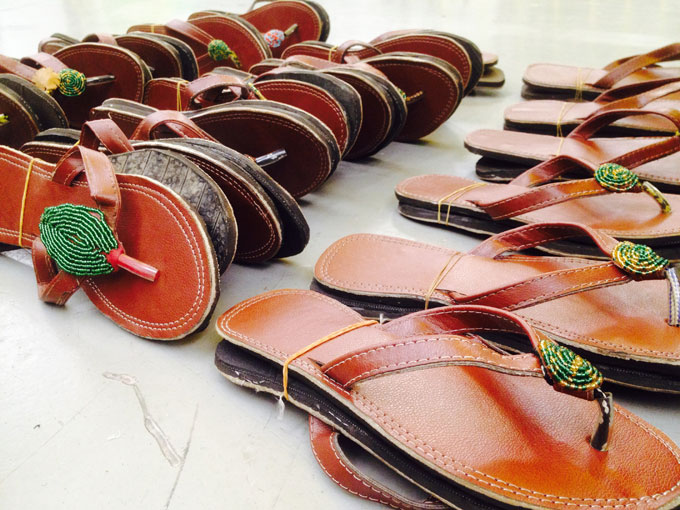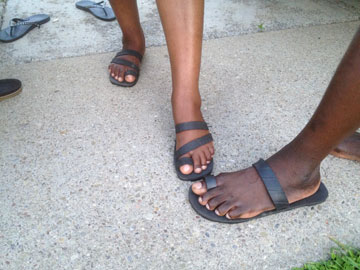Next story: Errol Daniels photos at Villa Maria score a knockout
The Atinga Project uses a new economic model to fight poverty in Rwanda
by Ethan Powers

Walking in their shoes
On a dreary winter day, Chris Way ruminated over his richly fulfilling study abroad experience in Rwanda. He stared thoughtfully at the pair of recycled-tire sandals that sat idly on his desk. They soon began to embody every ounce of the Africa he knew and studied, and reflected the character of the many Africans he worked alongside.

“I just kept looking at them and they became symbolic for me,” he said. “They started to encapsulate the transformational process of walking a mile in someone else’s shoes.”
While a student at Houghton College, Way spent four months in Rwanda in 2011 as a participant of Go ED.—an independent study abroad program that places students in some of the most poverty stricken areas of the world to inspire their personal commitment to help end world poverty. It was there that Way received his first pair of custom-fitted “rugabire,” sandals made entirely from recycled tire byproduct.
“The man who did it, he did it with so much dignity and humility,” said Way. “He just grabbed my foot, measured it, and he didn’t charge me a dime more than any other Rwandan. I was wowed by the whole experience.”
The trip deeply resonated with Way, and he continued to dwell on the plight of Rwanda and the African shoe artisans long after he returned to the States. The notion of a new kind of business plan began to take shape, one that would allow the Rwandan artisans to sell directly to Western consumers, who in-turn could take solace in contributing to an impoverished economy in need.
Way pitched his business plan during Buffalo’s “Startup Weekend 2013”—a get-together of emerging entrepreneurs where ideas are presented and teams form to collaborate around the top ideas. A team quickly formed around Way’s innovative humanitarian assistance plan, which made a splash throughout the weekend, winning third place despite being surrounded by countless other pitches. The teams whose startup ideas took the first and second place awards recognized Way and his endeavor by offering their prizes, one of which was the tools to create a website for the business.
“For them to turn around and say, ‘We think so much of your idea that we want to give you access to these tools rather than use them on our idea,’ it was just so encouraging for us going forward,” said Way.
With the added resources, the Atinga Project was well on its way to conception, drawing its name from the historical term, denoting honor and humility, for the African working class. Way received significant assistance from Alex Burgos, a University at Buffalo business and finance student who joined Way’s team at Startup Weekend and formed a working relationship with him. Burgos helped finically plan and forecast the initial monetary goals to be met, and Way still continues to use Burgos’ spreadsheets as reference. Another member of Way’s startup team, Megan Toombs, helped substantially with marketing.
While Burgos and Toombs have since moved on to their own career prospects, Way is working at full-speed on the Atinga Project’s Kickstarter campaign that commenced on September 19th with a goal of $12,500. The campaign’s launch event was at the dig space located at the Innovation Center of the Buffalo Niagara Medical Campus.
Way has an impromptu desk set up at dig—a large “open office” space designed to encourage entrepreneurial projects by offering affordable workspace and opportunity for collaboration. Way’s desk area is covered with blueprints, business concepts, countless boxes of Atingas and ingenuous promotional marketing. While Way is researching how to get retail stores to carry Atingas, his immediate plan is to develop the project’s online sales.
Following the conclusion of the Kickstarter campaign, customers will be able to visit the Atinga Project website and purchase a pair of authentic rugabire priced from $28-$36. Atinga styles include the Classic, Two-Strap, Rama, Slide, Kozi, and Keza. Artisans in Rwanda are given style specifications and measurements, and the sandals are then shipped to the U.S. for delivery.
In addition to paying the shoemakers a fair wage for their work, the Atinga Project is designed to provide them with a dividend of the business’ quarterly revenue, which can be used for the artisan community’s development.
“These people don’t just go and blow the money on something temporary. They go and put an iron sheeted roof on their home,” said Way. “That means that for 15, 20 years, they don’t have to worry during rain season about re-thatching that roof. So it gives that family financial stability to do other things.”
Way set up a bank account for the artisans and wires profits to his friend and business partner in Rwanda, Jean Bosco, who divvies the earnings among the shoemakers. Bosco, an orphan of the Rwandan Genocide of 1994, met Way while he was an international student and quickly formed a close friendship with him that led to the two partnering together in business.
Bosco essentially acts as a supervisor to the artisans on the ground in Rwanda, intermittently checking to see if they are meeting quality standards and goals. He packages the rugabire and uses a Brussels cargo company to ship them to JFK Airport. Way is responsible for paying customs fees and getting the shipment cleared.
The challenge, according to Bosco, is not shipping but negotiating with the artisans who believe that if they are selling to Western consumers, they should be able to significantly raise the price of the sandals. “I had to make them understand what we are doing. What the project is about,” he said.
Bosco says that his work with Chris Way and the Atinga Project has been incredibly gratifying as he’s been able to connect with struggling Rwandans whose stories reinforce the nation’s resiliency.
“When I talk to the artisans, they have so many touching stories,” he said. “They are so grateful about this project. They tell me about jobs where they would do so many things for little money. They now feel that they’re doing something valuable. They have hope for their lives now because of what they’re doing with this project.”
The Atinga Project, even though still in its infancy stage, has already had wildly positive ramifications for the Rwandan community, particularly for the family of Fidele “Kazungu” Bwanakeye, one of the project’s featured artisans and a citizen of Kigali. Kazungu first met his wife while at work repairing shoes when she came in to get a pair fixed. They now have two kids together, and the trade which facilitated their love for one another is now bringing in much needed income for their family. Kazungu has seen his wife able to start a corner store from the money he has earned with the project.
“The project will help them to put their children in schools. They are able to help not just themselves, but their families as well,” said Bosco of all who might participate with Atinga. “Everyone who we can involve in this project, that is a few more people who can raise themselves out of poverty in Rwanda.”
While companies like TOMS shoes promote the concept of the “one for one” business model in which a pair of free shoes are delivered to a child in need for every pair of TOMS that are purchased, critics continue to argue that all foreign aid—be it from businesses, nonprofits or governments—is ultimately detrimental to the African economy as it undercuts African workers and business owners. According to Way, it falls on the consumer to know the implications of what we buy and how it affects those along the profit chain.
“We want to showcase a different side of Africa,” said Way of the Atinga Project. “The one that’s underrepresented, and we don’t want to do it simply to sell our product.”
Way believes that the potential his endeavor holds is endless, and if successful, can be among the first in a new line of business models that forego the “charity” perspective that has held back evolving economies like Africa’s, opting instead for one that places emphasis on the talent and pride of the developing country itself.
“The bottom line here is that we want to showcase for our generation as well as for future generations that you can integrate charity and business. We no longer have to do it in a patronizing way.”
Jean Bosco’s interview was done in Kinyarwanda, his native language. The interview was conducted and translated by Immaculee Ndayisaba, a Rwandan-American friend of Chris Way.
blog comments powered by Disqus|
Issue Navigation> Issue Index > v13n41 (Week of Thursday, October 9) > The Atinga Project uses a new economic model to fight poverty in Rwanda This Week's Issue • Artvoice Daily • Artvoice TV • Events Calendar • Classifieds |









 Current Issue
Current Issue